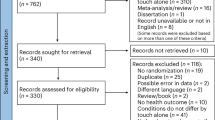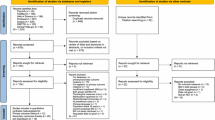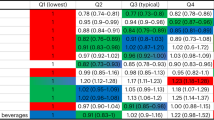Abstract
Background:
There are a number of factors influencing individual food habits and the prerequisite for effective national strategy development is reorganization of factors aggravating or facilitating this dynamic process.
Aims:
The aims of this paper are to present a Croatian contextual framework influencing individual-based nutrition communication strategies and to identify important factors by general practitioners (GPs) and population.
Methods:
Two Croatian surveys are presented. The first one was carried out among GPs (random 425 GPs, all with office on lease) and the second on an adult population in Croatia (random 9060 respondents) answering the question: ‘In the past year, has anyone advised you to change your behaviour?’
Results:
The Croatian case studies showed that GPs considered smoking and alcohol as more important public health issues than unbalanced nutrition and physical activity. GPs also recognized their role in individual work with patients in secondary and tertiary prevention, less in primary prevention or work with groups and the community. Among the obstacles in individual-based communication in daily work, they reported lack of time, lack of incentives, lack of knowledge and lack of family approach in nutrition consultation. They were more likely to advise the elderly, those with lower education, unemployed, overweight, those who lived alone and those who visited GP's office regularly. Differences in respondents' answers are determined by education and workplace.
This is a preview of subscription content, access via your institution
Access options
Subscribe to this journal
Receive 12 print issues and online access
$259.00 per year
only $21.58 per issue
Buy this article
- Purchase on Springer Link
- Instant access to full article PDF
Prices may be subject to local taxes which are calculated during checkout





Similar content being viewed by others
References
Brotons C, Ciurana R, Pineiro R, Kloppe P, Godycki-Cwirko M & Sammut MR (2003): Dietary advice in clinical practice: the view of general practitioners in Europe. Am. J. Clin. Nutr. 77 (Suppl), 1048S–1051S.
Croatian National Institute of Public Health (2003): Croatian Health Service Yearbook 2003. Zagreb: Croatian National Institute of Public Health.
Eaton CB, Goodwin MA & Stange KC (2002): Direct observation of nutrition counseling in community family practice. Am. J. Prev. Med. 23, 174–179.
European Observatory on Health Care systems (1999): Health Care Systems in Transition: Croatia WHO Regional Office for Europe (document AMS 5001891/CRO).
Fuller TI, Backett-Milburn K & Hopton JI (2003): Healthy eating: the views of general practitioners and patients in Scotland. Am. J. Clin. Nutr. 77 (Suppl), 1043S–1047S.
Grant AM, Niyonsenga T, Dion I, Delisle E, Xhignesse M & Bernier R (1998): Cardiovascular disease: physicians' attitude toward prevention and treatment. Can. Fam. Physicians 44, 781–787.
Hiddink GJ, Hautvast JG, van Woerkom CM, Fieren CJ & van't Hof MA (1995): Nutrition guidance by primary care physicians: perceived barriers and low involvement. Eur. J. Clin. Nutr. 49, 842–851.
Hiddink GJ, Hautvast JG, van Woerkom CM, Fieren CJ & van't Hof MA (1997): Consumers' expectations about nutrition guidance: the importance of primary care physicians. Am. J. Clin. Nutr. 65 (Suppl), S1974–S1979.
Honda K (2004): Factors underlying variation in receipt of physician advice on diet and exercise: applications of the behavioral model of health care utilisation. Am. J. Health Promot. 18, 370–377.
Kottke TE, Foels JK, Hill C, Choi T & Fenderson DA (1984): Nutrition counseling in private practice: attitudes and activities of family physicians. Prev. Med. 13, 219–225.
Kushner RF (1995): Barriers to providing nutrition counseling by physicians: a survey of primary care practitioners. Prev. Med. 24, 546–552.
McAvoy B, Kaner EFS, Lock LA, Heater N & Gilvarry E (1999): Our healthier nation: are general practitioners welling and able to deliver? A survey of attitudes to and involvement in health promotion and lifestyle counseling. Br. J. Gen. Pract. 49, 187–190.
Moore H & Adamson AJ (2002): Nutrition interventions by primary care staff: a survey of involvement knowledge and attitude. Public Health Nutr. 5, 531–536.
Moore H, Adamson AS, Gill T & Waine C (2000): Nutrition and the health care agenda: a primary care perspective. Fam. Pract. 17, 197–202.
Potter MB, Vu JD & Croughan-Minihane M (2001): Weight management: what patients want from their primary care physician. J. Fam. Pract. 50, 513–518.
Truswell AS, Hiddink GJ & Blom J (2003): Nutrition guidance by family doctors in a changing world: problems, opportunities, and future possibilities. Am. J. Clin. Nutr. 77 (Suppl 4), 1089S–1092S.
Van Dillen SME, Hiddink GJ, Koelen M, de Graaf C & van Woerkum CMJ (2003): Understanding nutrition communication between health professionals and consumers: development of a model for nutrition awareness based on qualitative consumer research. Am. J. Clin. Nutr. 77 (Suppl), 1065S–1072S.
Van Weel C (1999): International research and the discipline of family medicine. Eur. J. Gen. Pract. 5, 110–115.
Author information
Authors and Affiliations
Corresponding author
Additional information
Discussion after Pavlekovic
Van Weel: Can you tell us a bit more about the contract family doctors have in Croatia? Last year I was in Croatia, and then they were negotiating the new contract, and one of the fascinating things of that was that GPs in Croatia receive protected time for health education and prevention. Did that materialize?
Pavlekovic: In the past, we had a very high level of social security and health security. Everyone had the right to free of charge health services. In the last 15 y, the position of GPs has changed; at present, practically all GPs are working in rented offices with a contract with individuals. Quite often, especially in rural areas, this means that in the contract is the whole family. And they receive per capita from the health insurance funding for those families. Since last year, we have our contract with inhabitants who choose us; we are paid a certain percentage for preventive measures. This means that we can ask for financial support from health insurance companies for 20% or our work additionally. It is true that the list of preventive measures are very well done. Including health educational work. This is I would say a good prerequisite, because at least GPs are externally motivated for prevention. But the problem in reality is that you can say to someone: wash your hands, but if you do not give him the soap and water he will not do so. So even if they are stimulated financially, they do not have the other prerequisites to do prevention, like education. And also there is the problem of the number of patients that we have. The average consultation in my country is 4 min.
Truswell: One of the classic descriptions of the Mediterranean diet is the one as surveyed in the Seven Countries Study. The coastal part of Croatia then was called Dalmatia. These people had a typical Mediterranean diet, with a lot of fish. Inland they had a more German/Bulgarian diet. There are not many countries with such diversity in intake.
Pavlekovic: And it is interesting that this difference is still present. I was involved in the Seven Countries Study as a very young physician.
Rights and permissions
About this article
Cite this article
Pavlekovic, G., Brborovic, O. Empowering general practitioners in nutrition communication: individual-based nutrition communication strategies in Croatia. Eur J Clin Nutr 59 (Suppl 1), S40–S46 (2005). https://doi.org/10.1038/sj.ejcn.1602173
Published:
Issue Date:
DOI: https://doi.org/10.1038/sj.ejcn.1602173
Keywords
This article is cited by
-
Examining the content of weight, nutrition and physical activity advices provided by Dutch practice nurses in primary care: analysis of videotaped consultations
European Journal of Clinical Nutrition (2014)
-
Nutrition communication styles of family doctors: results of quantitative research
European Journal of Clinical Nutrition (2005)



